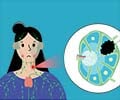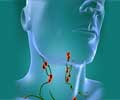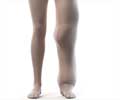- Castleman Disease Collaborative Network - (https://www.cdcn.org/about-castleman-disease)
- US department of health and human services-Unicentric Castleman disease - (https://rarediseases.info.nih.gov/diseases/6005/unicentric-castleman-disease)
- Castleman Disease: A Rare Condition with Endocrine Manifestations-Monitoring Editor: Alexander Muacevic and John R Adler Carmen E Cervantes and Ricardo Correa - (https://www.ncbi.nlm.nih.gov/pmc/articles/pmc4689570/)
- Atlas of Genetics and Cytogenetics in Oncology and Haematology- Antonio Cuneo- Gianluigi Castoldi- Hematology Section, Department of Biomedical Sciences, University of Ferrara, Corso Giovecca 203, Ferrara, Italy Hematology Section - (http://atlasgeneticsoncology.org/anomalies/castlemanid2123.html)
- CDCN- Castleman Disease Collaborative Network - (https://www.cdcn.org/about-castleman-disease/frequently-asked-questions)
- American Cancer Society-What Is Castleman Disease? - (https://www.cancer.org/cancer/castleman-disease/about/what-is-castleman-disease.html)
- Patient Care & Health Information-Diseases & Conditions-Castleman disease - (https://www.mayoclinic.org/diseases-conditions/castleman-disease/symptoms-causes/syc-20370735)
- NIH- National Cancer Institute - (https://www.cancer.gov/publications/dictionaries/cancer-terms/def/angiofollicular-lymph-node-hyperplasia)
- HHV-8-negative, idiopathic Multicentric Castleman disease: novel insights into biology, pathogenesis, and therapy-David C. Fajgenbaum, Frits van Rhee and Christopher S. Nabel - (http://www.bloodjournal.org/content/123/19/2924?sso-checked=true)
What is Castleman Disease?
Castleman disease (CD) is a rare disease of lymph nodes and lymphoid tissues in which there is an overgrowth of cells in your body's lymphatic system. These cells help to defend our body against disease and other invading foreign bodies. Castleman's disease is benign disease and can either affect one group or sometimes several groups of lymph nodes.
It was first described by Dr. Benjamin Castleman in the 1950s. It is also known as giant lymph node hyperplasia, and angiofollicular lymph node hyperplasia.
Though there is an abnormal overgrowth of cells of the lymph system which is similar in many ways to cancers of lymph nodes or lymphomas, CD is not cancer.
Unicentric or one group of lymph node enlargement affects only one part of the body, and usually the chest or abdomen is involved, whereas multicentric or more than one group of lymph node enlargement affects many groups of lymph nodes and lymphoid tissue all through the body and has been found to be associated with an increased risk of developing lymphoma later. CD can occur in people of all ages.
What are the Causes of Castleman Disease?
- The exact cause of Castleman disease is still not known (idiopathic).
- If you have HIV virus infection that causes AIDS, you have a higher risk of getting the multicentric form of Castleman disease since your immune system is weak. This also makes you more likely to get infected with another virus called HHV8 (Human Herpesvirus 8). Scientists have found that this virus seems to be linked in some way to the excessive cell growth in the lymph nodes.
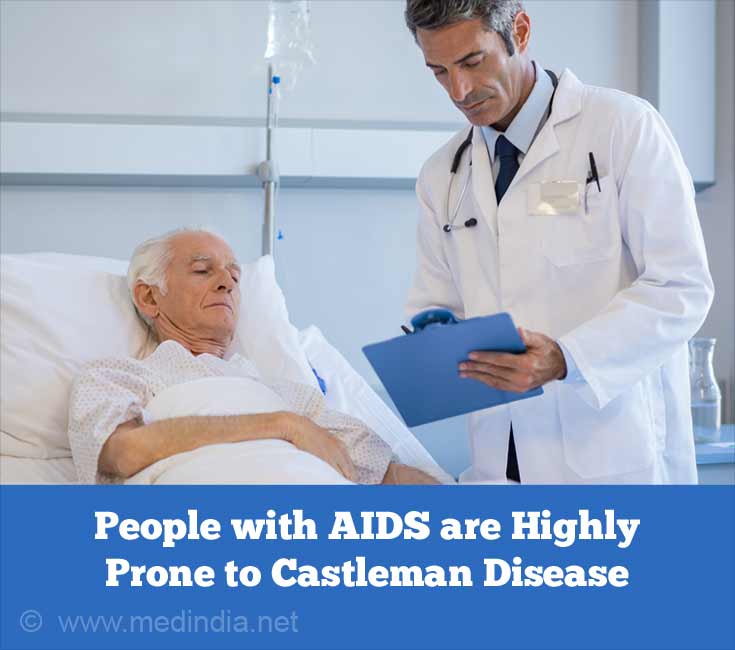
- However, according to some scientists an increased production of interleukin-6 (IL-6), a substance normally produced by cells within the lymph nodes to help fight infection may result in an overgrowth of lymphatic cells and may result in UCD.
What are the Symptoms and Signs of Castleman Disease?
- Many people with unicentric Castleman disease mostly do not exhibit any signs or symptoms. The diseased lymph node is usually located in the chest, neck or abdomen.
- Some signs and symptoms include an enlarged lump under the skin in the neck, groin or under arms, feeling of fullness or pressure in the chest or abdomen that can cause difficulty breathing or eating, feeling of fullness in the chest or stomach and
unintended weight loss .
If you have MCD, you may also have some of the same symptoms as UCD, but also other symptoms such as:
- Fatigue
- Fever
- Loss of appetite
- Skin rashes
- Sweating, especially during the night
- Weight loss
- Swelling or damage to organs such as liver, kidneys, bone marrow or spleen.
- Weak or numbness in hands and feet due to nerve damage.
How do you Diagnose Castleman Disease?
If Castleman disease is suspected, your doctor will first ask you about your medical history and about the duration and severity of your signs and symptoms. Then the doctor will perform a physical examination by feeling your lymph nodes, to determine their size and consistency. The following laboratory tests may be advised to help confirm the diagnosis of CD.
- Blood and urine tests:These tests help to rule out other infections or diseases and also reveal anemia and abnormalities in blood proteins that are characteristic of Castleman disease.
- Imaging tests (CT/ MRI/ PET):They help to detect enlarged lymph nodes, liver or spleen. CT scan or MRI of your neck, chest, abdomen and pelvis may be performed. Positron emission tomography (PET) scans may also be used to diagnose Castleman disease and to assess the effectiveness of treatment.
- Lymph node biopsy: A tissue sample from an enlarged lymph node is removed and examined under a microscope. This helps to differentiate Castleman disease from other types of lymphatic tissue disorders, such as lymphoma.
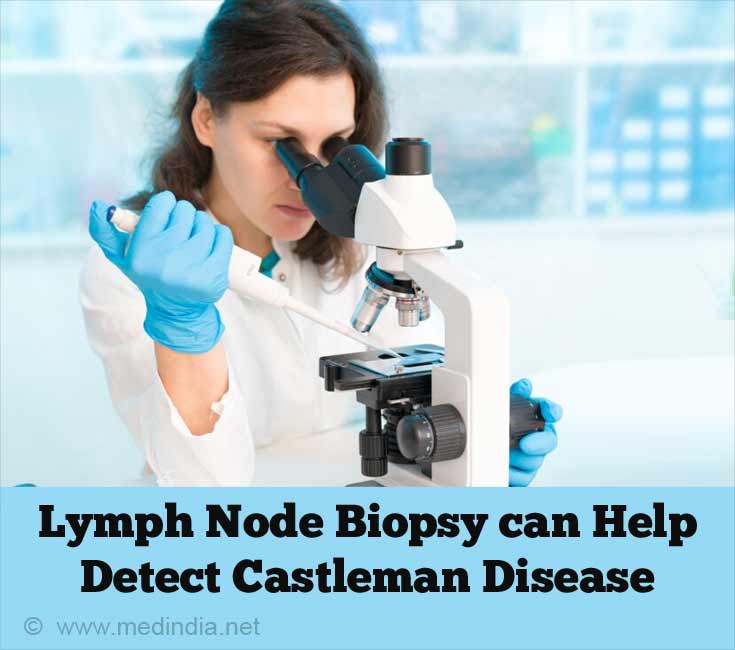
People with unicentric Castleman disease often notice no signs or symptoms and the diseased lymph node may be found incidentally during screening or treatment for another disease.
How do you Treat Castleman Disease?
- Unicentric Castleman disease can be cured by surgically removing the diseased lymph node. If surgical removal is not possible, medication or radiation therapy may be used to shrink the lymph node or destroy the affected tissue.
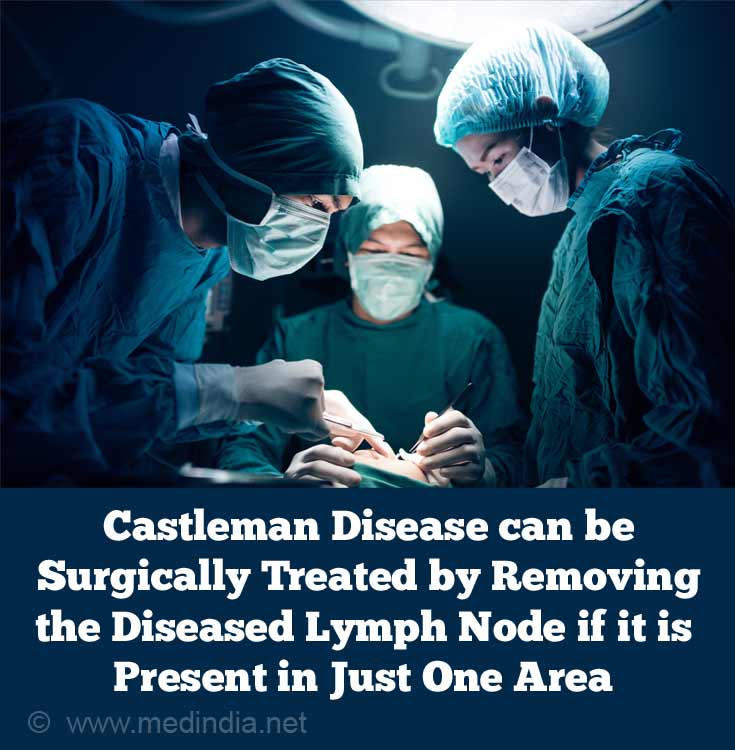
- For multicentric Castleman disease surgery is not recommended because of the large number of lymph nodes involved. However, surgery to remove an enlarged spleen may be done to help ease symptoms. Treatment generally involves medications and other therapies to control cell overgrowth. Specific treatment depends on the extent of your disease and on whether you have HIV or HHV-8 infection or both.
- Monoclonal antibodies: These block the action of the IL-6 protein that contributes to cell overgrowth.
- Chemotherapy: This treatment is done if CD does not respond to monoclonal antibodies or if you have organ failure. It helps to slow down the excessive and fast growth of lymphatic cells.
- Corticosteroids:These help to control inflammation.
- Antiviral drugs: These drugs block the activity of HHV-8 and HIV viruses.
- Thalidomide (Thalomid): Thalidomide is an immune-system modulator used to block the action of the IL-6 protein and has been effective at inducing remission in Castleman disease.
How to Prevent Castleman Disease?
There is no known way to prevent CD as the exact cause is not clearly understood, If you have HIV virus that causes AIDS, you have a higher risk of getting the multicentric form of Castleman disease. Also since your immune system is weak, you're more likely to get infected with another virus called HHV8. Hence the best way to reduce your risk for Castleman disease is to protect yourself against HIV infection.
What is the Prognosis of Castleman Disease?
The prognosis for people with unicentric Castleman disease (UCD) is generally favorable. In most cases, the condition can be cured by surgically removing the affected lymph node.
The prognosis for people with multicentric Castleman disease is usually poor because multicentric Castleman disease patients also suffer from complications such as infections leading to the failure of multiple organs and cancer such as lymphoma and Kaposi's sarcoma The presence of HIV/AIDS tends to make the outcome more unfavorable.


